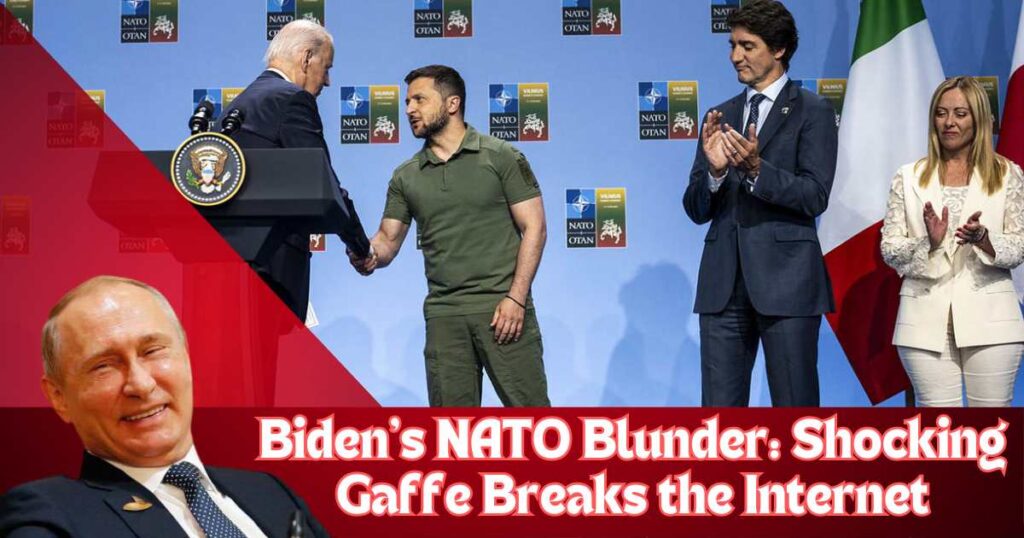Biden NATO Blunder Sparks International Concern and Debate
In a moment that has quickly become a focal point of international discourse, President Joe Biden mistakenly introduced Ukrainian President Volodymyr Zelensky as “President Vladimir Putin” during a recent NATO summit. This Biden NATO blunder, made in front of a global audience, has sparked a wave of reactions and raised serious concerns about its impact on NATO’s support for Ukraine. While Biden tried to correct his mistake, the incident has intensified debates about his age and capacity to lead the United States.
Biden’s NATO Blunder: A Crucial Error on the World Stage
During a pivotal speech at the NATO summit, President Biden committed a significant error by introducing the President of Ukraine, Volodymyr Zelensky, as “President Vladimir Putin.” This Biden NATO blunder, broadcasted live to millions, was met with immediate shock and disbelief. In attendance were leaders from various NATO countries and members of Biden’s own team. Despite Biden’s quick attempt to clarify his statement, the damage was already done. His subsequent explanation, stating that he was preoccupied with the need to defeat Putin, did little to lessen the impact of his blunder.
Immediate Reactions and Media Frenzy
The media, both in the United States and internationally, swiftly latched onto Biden’s mistake. Clips of the gaffe went viral, generating widespread ridicule and concern. This incident is not an isolated one; Biden has made several public missteps that have sparked debates about his mental sharpness and ability to govern effectively. The international community, particularly NATO allies, is now questioning the implications of having a U.S. President who seems increasingly prone to such errors.
The Psychological Impact on NATO’s Support for Ukraine
Biden’s blunder is more than just a verbal slip; it carries significant psychological repercussions. For Ukraine, which is enduring a brutal war against Russian aggression, the unwavering support of NATO is vital. Biden’s mistake could be perceived as a sign of weakening resolve or confusion about the key players in the conflict. Such perceptions can undermine morale and unity within NATO, potentially emboldening adversaries like Russia.
Biden’s Age and Leadership Capabilities
At 81 years old, President Biden’s age has become a central point of criticism. His performance in public appearances, debates, and high-stakes meetings has led to questions about whether he should continue to lead the country and the Democratic Party. The incident at the NATO summit has added fuel to these debates, with some Democratic leaders suggesting that Biden should step aside for a younger candidate to take on former President Donald Trump in the upcoming elections.
NATO’s Reaction and Broader Implications
Despite the blunder, the NATO summit in Washington D.C. was not entirely unsuccessful. The United States announced a $225 million military aid package for Ukraine, signaling continued support. However, the broader implications of Biden’s gaffe cannot be ignored. NATO leaders, including Italian Prime Minister Giorgia Meloni, were visibly unimpressed. Meloni’s reactions, captured on camera, displayed frustration and impatience, highlighting a growing lack of confidence in Biden’s leadership.
NATO’s Stance on China
In a significant development, NATO countries officially accused China of enabling Russia’s war against Ukraine. This marks the first time such an accusation has been made at a NATO summit, setting the stage for potential sanctions against China. This development raises important questions about the U.S. relationship with China, especially concerning American companies like Tesla that continue to invest heavily in China despite escalating geopolitical tensions.
The Path Forward for Biden and the U.S.
The coming months will be critical for President Biden and his administration. As debates and elections approach, Biden’s performance and ability to lead will be under intense scrutiny. The U.S. media has already begun revealing past incidents that raise concerns about Biden’s fitness for office. For instance, reports have surfaced about a critical meeting with the German Chancellor in 2022, where Biden reportedly felt too tired to continue late into the evening, leading to a postponed discussion about the Ukraine war.
Questions for Reflection
- How does President Biden’s age impact his ability to effectively lead the United States and NATO?
We encourage readers to share their thoughts and join the discussion. Your insights and opinions are valuable as we navigate these complex geopolitical issues.
Conclusion
President Biden’s recent blunder at the NATO summit has far-reaching implications for U.S. leadership and the alliance’s support for Ukraine. As the world watches, the United States must address these challenges head-on, ensuring that its leadership remains strong and credible. The coming months will be pivotal in determining the future trajectory of U.S. and NATO’s involvement in global affairs.

